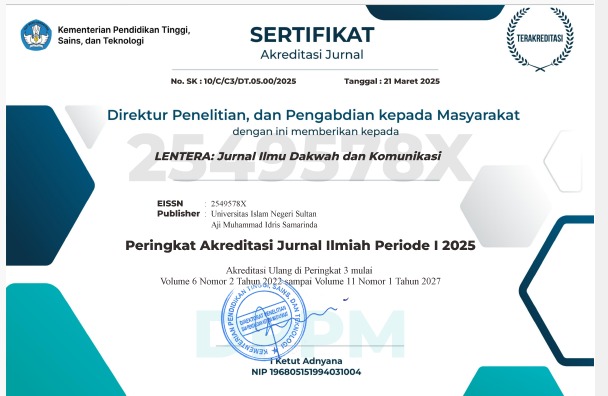Studi Dramaturgi Presentasi Diri Da’i Migran di Kota Bengkulu
Abstract
This paper aims at descriptively revealing the impression management regarding self-presentation of da’i migran (migrant preachers) in Bengkulu that includes: front stage and back stage within the communication process of everyday social life. This research applies qualitative approach within the tradition of dramaturgy. Data were collected through observation, interview and documentation. Findings reveal that the life of migrant preachers that occur in the front stages are very different with those that happened in the back stages. When he/she is in his/her front stages, a migrant preacher is required to act in a distinct manner to match his/her role such as exemplary role, polite in speaking, appropriate and proper in dressings, and live a humble life. In his/her back stage, a migrant preacher is free from such norms since there are no one to watch him/her. Here, a migrant preacher can live his/her take off his/her social mask and can life more authentically because without having to follow the instructions as she/he has to do in the front stage.
Keywords: Da'wah activities, dramaturgy, migrant preachers and self-presentation
References
Bahfiarti, Tuti, ‘Mistifikasi “Bissu” Dalam Upacara Ritual Adat Etnik Bugis Makassar (Kajian Studi Dramaturgi)’, Jurnal Ilmu Komunikasi, 1.2 (2011), 160–69
Basrowi, and Sukidin, Metode Penelitian Kualitatif Perspektif Mikro (Surabaya: Insan Cendikia, 2002)
Benedictus, A.S, ‘Konstruksi Diri Dan Pengelolaan Kesan Pada Ruang Riil Dan Ruang Virtual’, Jurnal ASPIKOM, 1.1 (2010), 26–40
Benford, Robert D., and A. Paul Hare, ‘Dramaturgical Analysis’, International Encyclopedia of the Social & Behavioral Sciences: Second Edition, August, 2015, 645–49
Berawi, Muliawati, ‘Etika Dakwah Pada Masyarakat Global’, Jurnal Ilmu Dakwah & Pembangunan, XIV.1 (2019), 39–58
Cresswell, John W, Qualitative Inquiry and Research Design Choosing Among Five Traditions (California: Sage Publications, Inc., 1998)
Fatoni, Uwes, and Annisa Nafisah Rais, ‘Pengelolaan Kesan Da’i Dalam Kegiatan Dakwah Di Pemuda Hijrah’, KOMUNIKA: Jurnal Dakwah Dan Komunikasi, 12.2 (2018), 211–22
Lindlof, Thomas R., Qualitative Communication Research Methods. (Thousand Oaks, CA: Sage, 1995)
Ma’arif, Bambang S., Parihat Parihat, Umar Yusuf, and Suliadi Suliadi, ‘Persuasive Da’wah Activities and the Socio-Demographic Factor’, in Proceedings of the Social and Humaniora Research Symposium (SoRes 2018) (Paris, France: Atlantis Press, 2019), CCCVII, 1–6
Moleong, Lexy J, Metodologi Penelitian Kualitatif, Cet-20 (Bandung: Remaja Rosda Karya, 2005)
Mulyana, Deddy, Ilmu Komunikasi: Suatu Pengantar (Bandung: Remaja Rosdakarya, 2007)
———, Metode Penelitian Kualitatif: Paradigma Baru Ilmu Komunikasi Dan Ilmu Sosial Lainnya (Bandung: Remaja Rosdakarya, 2013)
Putrawan, Agus Dedi, ‘SEKOLAH PERJUMPAAN SEBAGAI GERAKAN DAKWAH BERBASIS KOMUNITAS’, LENTERA, 2.2 (2018), 207–21
Rahman, Haidir, ‘DAKWAH PRA KENABIAN: Reorientasi Dakwah Melalui Pendekatan Historis’, LENTERA, 2.2 (2018), 163–83
Ritzer, George, Teori Sosiologi Modern, ed. by Triwibowo S B, 7th edn (Jakarta: Penerbit Prenadamedia Group, 2014)
Rohim, Syaiful, ‘Pertunjukan Imam Sholat Dan Tafsir Politik Jamaah’, Analisis: Jurnal Studi Keislaman, 14.1 (2014), 91–110
Santoso, Edi, Teori Komunikasi. (Yogyakarta: Graha Ilmu, 2012)
Sulaeman, Irta Sulastri, and Ali Nurdin, ‘Dramaturgi Komunikasi Dakwah Para Da’i Di Kota Ambon: Pola Pengelolaan Kesan Di Panggung Depan’, Jurnal Komunikasi Islam, 08.01 (2018), 86–110
Suneki, and Haryono, ‘Paradigma Teori Dramaturgi Terhadap Kehidupan Sosial’, Civis, 2.2 (2012), 1–11
Thadi, Robeet, ‘Tafsir Komunitas Dakwahtainment Di Televisi’, Jurnal Ilmiah Syi’ar, 13.2 (2018), 23–34
Copyright (c) 2020 LENTERA

This work is licensed under a Creative Commons Attribution-ShareAlike 4.0 International License.
Penulis yang menerbitkan artikel di Lentera: Jurnal Ilmu Dakwah dan Komunikasi setuju dengan ketentuan berikut:
- Penulis memiliki hak cipta artikel dan memberikan hak jurnal untuk publikasi pertama dengan karya yang secara simultan dilisensikan di bawah CC-BY-SA atau The Creative Commons Attribution – ShareAlike Licence.
- Penulis dapat membuat perjanjian kontrak tambahan yang terpisah untuk distribusi non-eksklusif versi jurnal yang diterbitkan dari karya tersebut (misalnya, mempostingnya ke repositori institusional atau menerbitkannya dalam sebuah buku), dengan pengakuan atas publikasi awalnya di jurnal ini.
- Penulis diizinkan dan didorong untuk memposting pekerjaan mereka secara online (misalnya, dalam repositori institusional atau di situs web mereka) sebelum dan selama proses pengajuan, karena dapat menyebabkan pertukaran yang produktif, serta kutipan yang lebih awal dan lebih besar dari karya yang diterbitkan (Lihat The Effect of Open Access)
Authors who publish articles in Lentera: Jurnal Ilmu Dakwah dan Komunikasi agree to the following terms:
- Authors retain copyright of the article and grant the journal right of first publication with the work simultaneously licensed under a CC-BY-SA or The Creative Commons Attribution–ShareAlike License.
- Authors are able to enter into separate, additional contractual arrangements for the non-exclusive distribution of the journal's published version of the work (e.g., post it to an institutional repository or publish it in a book), with an acknowledgment of its initial publication in this journal.
- Authors are permitted and encouraged to post their work online (e.g., in institutional repositories or on their website) prior to and during the submission process, as it can lead to productive exchanges, as well as earlier and greater citation of published work (See The Effect of Open Access).












.png)
